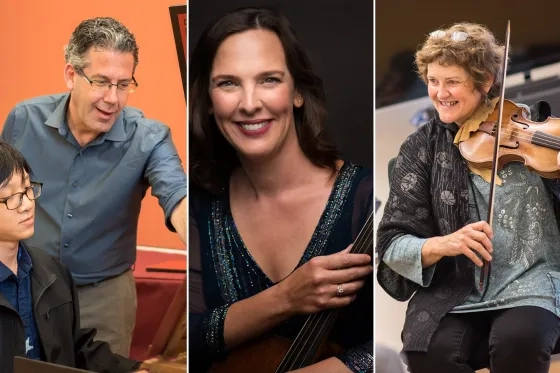SFCM to Offer Four New Master's Degrees in Historical Performance
SFCM will continue offering one-year Professional Studies Certificates in Baroque violin, viola, historical keyboards, and historical performance in voice.
SFCM is proud to announce new opportunities for students seeking to further their study of period instruments and historical performance, with new master's degrees being offered in baroque violin, viola, cello and viola da gamba beginning in 2024. The expanded degree offerings build on the existing Professional Studies Certificates offered in period strings and degrees in historical keyboards, but with drastically expanded opportunities for ensemble performances and individual attention.
"This will be one of the only opportunities to do this kind of degree on the West Coast," Elisabeth Reed, who teaches Baroque cello and viola da gamba, and co-directs the Conservatory's Baroque Ensemble with Historical Performance department chair Corey Jamason, said. "This is really a great place to go to school because the Bay Area is one of the largest historical performance centers in the country. There's a lot of professional groups, like Philharmonia Baroque Orchestra, and a real community here with people at all stages of their career, so it's much easier to start your own group and do your own things because there's a real understanding in the audiences here of early music and an enthusiasm for that."
Much of this is due to the legacy of SFCM's founding Historical Performance chair Laurette Goldberg, who founded the Philharmonia Baroque Orchestra—the first and, for some time, only orchestra dedicated to such music in the country—as well as the San Francisco Early Music Society. Baroque violin professor Elizabeth Blumenstock, Jamason, and Reed all take active leading roles in such as PBO and American Bach Soloists and other leading ensembles, offering students unprecedented access to a variety of artists associated with these groups. "With SFCM's studio size," Jamason said, "students here are getting one-on-one time with some of the most prominent musicians in this field." (SFCM's student-to-teacher ratio is 3:1.)
Expanding the degree offerings will afford students many more opportunities for performances and collaborations while at SFCM, and with that, more opportunities to utilize the Conservatory's impressive collection of historical instruments. "We have some Baroque violins and cellos that are 17th and 18th-century instruments," Reed says, "as well as beautiful modern copies, such as viols made by Francis Beaulieu in Montreal." The period instrument collection contains numerous harpsichords, including instruments made by local builders Kevin Fryer and John Phillips.
Blumenstock is excited about the possibilities for the upcoming generations of music interested in early music. "The music is so much more available and visible now then it was when I was starting, so it's not as much of a threat to take on learning and performing it. And the other thing is that more and more students go through a 'normal' performance program and discover their love of this music, and now they come back and specialize in it. They're in a wonderful position because if they can get these skills in early music, it's a tremendous asset to them as they go out and begin their careers."
"We recognize that people are coming to early music at all different levels," Jamason said. "Potential students don't have to have vast experience with the music before committing to studying it. We want our program to feel inclusive and inviting."
Learn more about the Historical Performance department and its expanded offerings at SFCM.
